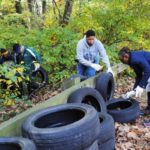By David A. Love | ecoWURD.com Contributor
When people see a problem in their community, how should they solve it? Should they complain and ask others for assistance? Or can they take matters into their own hands?
Some will go a bold extra step. They will identify a host of related and unrelated conditions in their community and help to rebuild and support the people living in it.
That last choice is exactly what Jordan Ferrarini did in his own neighborhood. For this Germantown resident, the issue at hand was the need to clean up littered streets. So, he did that: by buying trash trucks as part of the nonprofit organization he leads, Trades for a Difference (TFAD).
Taking a holistic approach to the community, TFAD fills a need around neighborhood beautification. But it also fills another essential need for young people in the neighborhood by hiring, training and mentoring them. That means preparing them leadership, mentoring them into entrepreneurs, and helping them become skilled tradespersons and socially responsible citizens. In the process, Ferrarini and TFAD’s staff and volunteers are creating a new economy, utilizing neighborhood mapping to create jobs around trash, cleanup and demolition services, and utilizing the trash trucks for other purposes that come along.
Recently, ecoWURD caught up with Jordan Ferrarini and talked with him about TFAD and the work he is undertaking in Germantown.
ECOWURD: Why did your organization buy the trash trucks, and why did you decide to take matters into your own hands? And is this about more than cleaning the streets?
FERRARINI: A lot of things prompted us to buy trash trucks. There was a definite need for it, throughout the city of Philadelphia, especially our own area. We see the effects of trash and debris in our own area. You can see trash literally up and down the street. That can have a big effect on the state of hopelessness in the minds of our young people, their negativity. The trash and debris perpetuate a state of hopelessness among our young people. It affects the city as a whole. We wanted to change the narrative.
The education we put our youth through is community service and giveback. We want them to inherit characteristics and traits of leadership. We incorporate a lot of community service, from repair of dilapidated buildings to repairs for low income seniors, veterans, people living below the poverty line, and repairs to beautify the neighborhood–from building planters, community libraries, painting different pieces of the park. Community service plays a big part.
We saw a huge need in the trash and asked: How do we help them develop skills and characteristics to take leadership in the neighborhood? We saw a silver lining in the trash.
ECOWURD: What is the situation with young people in Germantown in terms of employment, their inclusion in the economy or lack thereof? How do you hope to impact their lives? How is TFAD helping young people, and how is the community responding?
FERRARINI: Germantown is a wonderful place.
There’s a lot of different people and cultures and ethnicities and religions represented in Germantown. Like other places that have a different range of backgrounds and different tiers of the economic ladder. There are those who have and don’t have. This is the case in Germantown, as well, especially in the lower end of the south side of Germantown and the southeast side of Germantown. There’s a lot of blight, a lot of gun violence, homicides. A lot of our goals and our initiatives and agendas are focused on areas that are on harder times, a higher rate of violent crime. Through our initiatives and programs our goal is to employ young people. It’s easy to tell them to get off the corner but if you don’t give them tangible steps to get off the corner you know it’s not going to be sustainable.
In our community there’s a scarcity of opportunity. There’s a huge population of people, they’re not readily available and visible or something people perceive as obtainable. They see success as a pipe dream, not attainable. They lack that vision because they’re stuck in that area where they don’t see it on a daily basis. We provide them with steps to recirculate social capital from those who have made it out, and show them how to do the same. Cleanup initiatives start a dialogue to let them know there is more to life. We provide therapeutic coaching and mentoring and expose them to opportunities. We help make it real for them.
ECOWURD: What’s next for TFAD? Does your initiative provide a model that can be replicated across the city?
FERRARINI: Right now we are focusing on Germantown, sections of East Mt. Airy, sections of Olney that are in need of opportunities. There’s a need fpr beautification, there’s a need of improvement to infrastructure in Northwest and bordering areas of Northwest. We are looking to stay on the north side and northwest side of Philly, but we definitely are interested in being able to create as much opportunity as possible.
ECOWURD: What can the public do to assist your efforts?
FERRARINI: We are a 501(c)(3). If anyone is interested in assisting they can go to our website. Here’s also an email address if people are interested in collaborating.
We’re definitely looking for support and volunteering. We’re not trying to play saviors, we’re trying to be a part of the solution. These opportunities are so much bigger than trash. We are creating entry level opportunities, and hopefully they’ll work in the sanitation and environmental departments in Philadelphia.
ECOWURD: So what’s most important here?
FERRARINI: The one thing that’s important is we are doing this in collaboration. The city has been supportive. The Streets Department has been supportive and they are looking to assist and support.
I want to convey that this is solving a problem while creating a barrier to low entry jobs, while they’re going after other levels of success–in training, while they’re waiting to join a union or go to school, or while they’re still developing.The Streets Department has a Black commissioner. Trash is a very complex thing, and budgets are budgets. They’re trying to do the best they can and are willing to support us and provide opportunities for Black and Brown young men.



